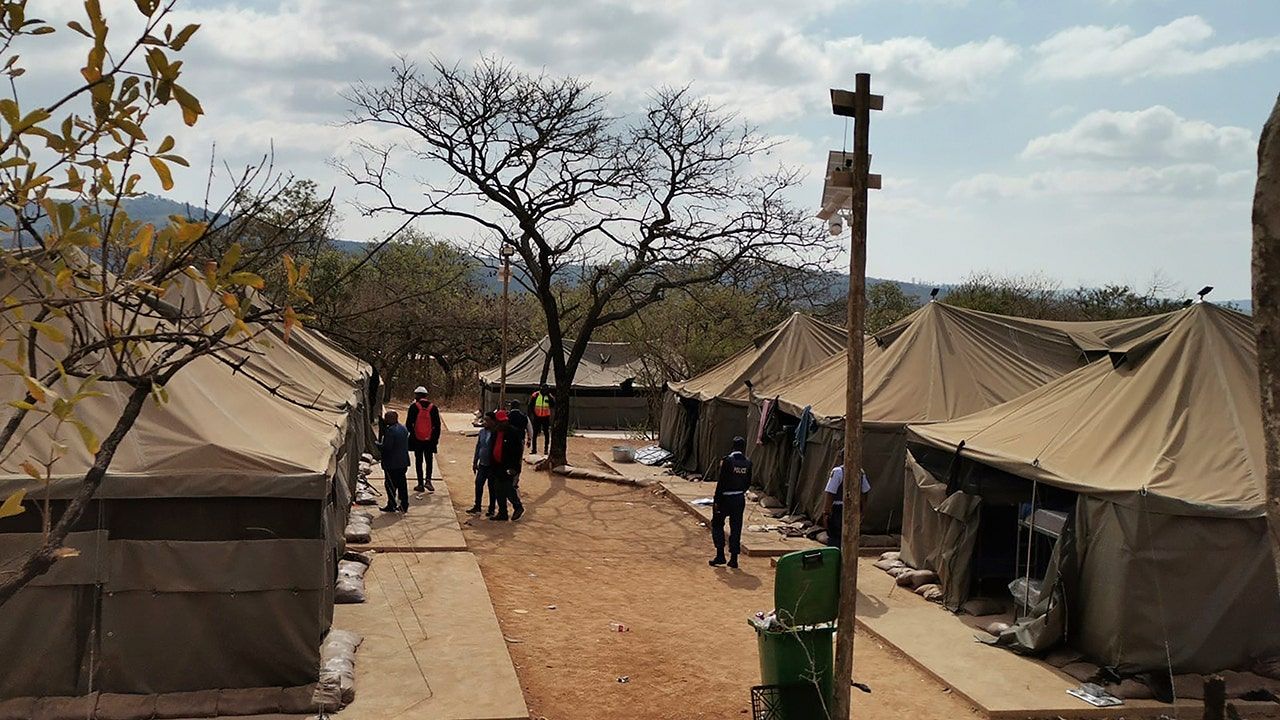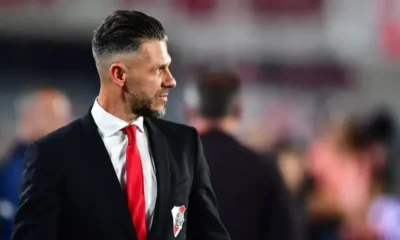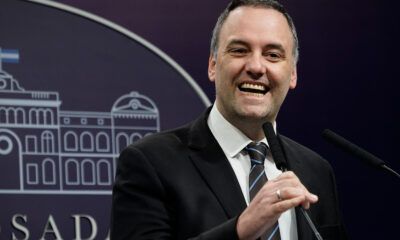INTERNACIONAL
Tras el anuncio de elecciones anticipadas en Francia, los partidos políticos corren para buscar alianzas

Después de la vertiginosa disolución de la Asamblea Nacional por parte del presidente Emmanuel Macron como respuesta al triunfo del ultraderechista Reagrupación Nacional en las elecciones europeas francesas, se inició en la misma madrugada una frenética rosca, que continúa en un país conmovido por los resultados.
¿Cómo frenar que el lepenismo llegue a ser primer ministro de Francia el 7 de julio es la pregunta de los partidos republicanos en estas horas? La respuesta probablemente se las de la abstención del 48,2 por ciento y a donde se dirigirán los que no fueron a votar en este voto de protesta. La respuesta es el país en “estado de reunión”. Mientras los alcaldes se preguntan cómo pagarán la inesperada convocatoria a elecciones tan rápidamente.
Cumbres de todas las tendencias y un escenario que se repite como en el 2002, cuando Jean Marie Le Pen llegó al ballotage en la presidencial. Los franceses eligieron masivamente a Jacques Chirac, en un voto republicano masivo.
Una aliada de Putin
¿Es que Marine le Pen ha conseguido “desdiabolizar” a su partido, xenófobo y ultraderechista, hasta el punto de la amnesia o el desconocimiento de las nuevas generaciones frente a lo que significa?, se preguntan. ¿Es que se olvidan que es la mejor aliada de Vladimir Putin?
Jean Marie Le Pen, el fundador del Frente Nacional, está bajo “curatella”. No intervendrá en la elección, no habrá “boutades” peligrosas en la carrera.
Las candidaturas deben registrarse entre el 12 y el 16 de junio.
El presidente Emmanuel Macron se reunió el lunes con su ex primer ministro Edouard Philipp en el Eliseo. Gabriel Attal, su joven premier, le rogó no disolver la Asamblea Nacional y le ofreció su renuncia .Pero Macron ya tenía esta idea de la disolución más que masticada. Es difícil hacer cambiar de opinión al Jupiteriano presidente francés, debilitado al extremo por los resultados.
Cumbre de las Le Pen
Sólo la Asamblea Nacional se disuelve en aplicación del artículo 12 de la Constitución francesa. El mandato de los senadores no termina en caso de disolución de la Asamblea Nacional: el Senado garantiza constitucionalmente la permanencia de la representación nacional y, por tanto, puede reunirse en cualquier momento.
Marine Le Pen se olvidó de sus diferencias con su sobrina Marion Marechal Le Pen, una “integrista” católica de ultraderecha, y se reunirán este lunes junto a ella y su pupilo, Jordan Bardella. Este jóven de 28 años, de origen migrante italiano y argelino, que si mantiene la tendencia de las elecciones europeas en las legislativas, podrá ser el premier francés en cohabitación con Emmanuel Macron. Una primera vez para la ultraderecha en el palacio de Matignon.
A las 5 de la tarde, hora de Francia, comenzó la Cumbre secreta de la Reagrupación Nacional en su sede. El presidente de RN, Bardella, quiere “construir la mayor concentración posible en las elecciones legislativas”. El objetivo es reconciliación y sumar.
 Marion Marechal Le Pen, una “integrista” católica de ultraderecha. Foto: AP
Marion Marechal Le Pen, una “integrista” católica de ultraderecha. Foto: APLos tres responsables tienen previsto debatir juntos las elecciones legislativas anticipadas del 30 de junio y del 7 de julio.
¿Alianza o no?
¿Es este el signo de una futura alianza de partidos entre RN y Reconquista, o sólo de individuos, con Marion Maréchal? Las próximas horas lo dirán, en esta Francia completamente politizada.
Una cosa es segura: Jordan Bardella acoge a Marion Maréchal como Marion Maréchal y no como emisaria de Éric Zemmour.
Será una “simple discusión”, precisa una fuente. Ella no viene como representante de la Reconquista” o emisaria del xenófobo Eric Zemmour. No existe ninguna discusión “partidista” y oficial entre los dos campos nacionalistas.
Marine Le Pen y Jordan Bardella ya han decidido que no habrá una “alianza electoral” con otros movimientos políticos, sino que la “reunión y la ampliación se harán caso por caso”, según varias fuentes coincidentes.
“Después del puntaje histórico de RN en las elecciones europeas, quiero construir la reunión más amplia posible en las elecciones legislativas. El momento es histórico”, advirtió Jordan Bardella a la prensa.
Con una alta abstención del 48,2 por ciento, la tendencia es sumar, agrupar, “reunirse” para ganar o ser derrotados. Esa es la estrategia de estas elecciones europeas, que por primera vez en la historia, amenazan al gobierno macronista tras la disolución de la Asamblea Nacional.
“A reunirse”
El presidente del RN, Jordan Bardella, que liderará la campaña de su bando en las elecciones legislativas sin ser candidato, llama a todas las figuras políticas de derecha a «reunirse». Jefe de lista de su partido en las elecciones europeas, Bardella obtuvo más del 31% de los votos. Un récord histórico. Marion Maréchal, que llevó a cabo una campaña larga y difícil, logró elegir a cinco eurodiputados por Reconquête, entre ellos ella.
“Esta tarde veo que el bloque nacional está en casi el 40%. La coalición de las derechas a la que aspiro parece más necesaria que nunca. Por eso siempre he distinguido a los adversarios de los competidores y me he negado a concentrar mis ataques contra Reagrupación Nacional”, declaró Marion Marrechal Le Pen el domingo por la tarde, afirmando que estaba dispuesta a dialogar con Marine Le Pen, Jordan Bardella, Eric Ciotti y Nicolas Dupont-Aignan.
 Marine Le Pen. Foto: AP
Marine Le Pen. Foto: AP “Trabajar juntos en la alternativa” es la consigna. La sobrina de Marine Le Pen está en conflicto abierto con Éric Zemmour, presidente de Reconquête, y Sarah Knafo, su asesora, con quienes salieron a la luz diferencias estratégicas durante la campaña.
La izquierda unida
La izquierda se reúne y se nuclea alrededor de su nueva estrella socialista, Rafael Glucksman, hijo del famoso académico maoísta. Obtuvo el 14 por ciento. El hablará a las 8 de la noche en la televisión, en pleno “prime time” este lunes, pero ya se suman los ecologistas a sus filas.
Tras el impactante anuncio de la disolución, ha llegado el momento de la movilización en todas las filas. El portavoz del grupo socialista en la Asamblea, Arthur Delaporte, espera «200 diputados de izquierda» al final de las elecciones legislativas anticipadas, declaró el lunes.
Recalcando la “necesidad de crear un nuevo Frente Popular”, “ahora que estamos contra la pared”, subrayó la “fuerza” de la izquierda. “Representamos el 30%, un poco más, de los votos recogidos ayer en el electorado de las elecciones europeas”, insistió. Un resultado que “también debe ser una señal” según él.
Francia política está en estado de reunión y de unión. Sumar a la derecha o a la izquierda. Manuel Bompard por La Francia Insumisa, Olivier Faure por el Partido Socialista Fabien Roussel por el Partido Comunista y Marine Tondelier por EELV ( ecologistas),s e reunirán en la tarde de este lunes en la sede de los ecologistas, confirmó Manuel Bompard .¿Es que podrán reeditar NUPES, que Jean Luc Melenchon hizo volar por el aire?
El precedente de 1997, cuando Jacques Chirac provocó elecciones legislativas anticipadas que su bando perdió, les hace temer un grave mal desempeño a los macronistas. Mucha gente se aferra a la esperanza de una amplia coalición con la derecha y la izquierda llamadas “republicanas”, como en el 2002, cuando Le Pen llegó al balloptage y los franceses votaron republicanamente a Jacques Chirac masivamente en la presidencial.
“La iniciativa tras las europeas es una ampliación, no hay mucho más que hacer. A LR y/o a los socialistas”, se confió estos últimos días el líder de los diputados del Renacimiento, Sylvain Maillard, sin sospechar que este objetivo implicaría una disolución muy peligrosa. “Todo esto es jugable, porque los socialistas y más aún el LR están cansados de permanecer en la oposición, ya no son percibidos como un partido de gobierno”, analizó.
Francia en erupción
Los conservadores Éric Ciotti, Bruno Retailleau y Gérard Larcher, líder de la Cámara Alta, se reúnen al final de la tarde en el Senado.
Los ejecutivos republicanos se reunirán a última hora de la tarde en el Senado para examinar la estrategia del partido de cara a las próximas elecciones legislativas.
Las elecciones más trascendentales
Francia se prepara para sus elecciones “más trascendentales” en décadas después de que el presidente del país, Emmanuel Macron, sorprendiera a los políticos y al público al anunciar elecciones legislativas anticipadas, tras una paliza de los lepenistas en las elecciones europeas.
El RN lepenista obtuvo alrededor del 32% de los votos el domingo, más del doble del 15% obtenido por los aliados de Macron, según las encuestas a pie de urna. Los socialistas, con un 14%, estuvieron a un paso del grupo Macron.
El partido Renacimiento de Macron tiene actualmente 169 diputados en la Asamblea Nacional y la RN lepenista 88.
La inesperada decisión, que equivale a un duro póker sobre el futuro político de Macron, podría otorgar un gran poder político a la extrema derecha, después de años al margen y neutralizar su presidencia tres años antes de que termine. Si el partido de extrema derecha obtiene una mayoría absoluta, el presidente perdería de hecho el control sobre la mayor parte de la política interna francesa.
«Estas serán las elecciones parlamentarias más importantes para Francia y para los franceses en la historia de la Quinta República«, dijo el ministro de Finanzas, Bruno Le Maire, a la radio RTL. “Debemos luchar por Francia y por los franceses. Tenemos tres semanas para hacer campaña y convencer a los franceses”.
La votación legislativa tendrá lugar el 30 de junio –menos de un mes antes del inicio de los Juegos Olímpicos de París– y una segunda vuelta el 7 de julio. Es probable que los resultados dependan de qué tan comprometidos estén los votantes de izquierda y centroderecha para mantener a la extrema derecha alejada del poder.
Los analistas han dicho que es poco probable que se alcance una mayoría absoluta de extrema derecha, en parte porque los votantes suelen utilizar las elecciones europeas como voto de protesta. Una elección parlamentaria puede dar resultados diferentes.
El caos con caos
La voz de los politólogos alertan. «Podríamos llegar a una situación ingobernable» si Reagrupación Nacional obtuviera una mayoría relativa en la Asamblea” afirmó a la AFP el politólogo Pascal Perrineau este lunes 10 de junio.
“Se trata de una novedad radical en la Quinta República: nunca después de unas elecciones europeas el Presidente de la República había intervenido y provocado tal terremoto político”, explicó el profesor de ciencias políticas.
Pascal Perrineau se mostró escéptico sobre la probabilidad de una coalición anti-RN durante las elecciones legislativas, considerando que “los franceses ya no se movilizan como un solo hombre contra la Reagrupación Nacional”. El politólogo considera posible que el partido de Le Pen consiga una mayoría en la Asamblea Nacional.
“Imagínense que Reagrupación Nacional tuviera una mayoría relativa, lo cual es totalmente posible. Pues experimentará las mismas dificultades que vive hoy la mayoría presidencial. Y básicamente habremos respondido al caos con caos”, afirmó.
INTERNACIONAL
95 Libyan nationals arrested in South Africa at suspected secret military training camp

South African police arrested 95 Libyan nationals in a raid on a suspected secret military training camp on Friday and authorities said they were investigating whether there were more illegal bases in other parts of the country.
The camp was discovered at a farm in White River in the Mpumalanga province, about 360 kilometers (220 miles) northeast of Johannesburg, police said.
ELEPHANTS KILL TOURIST IN SOUTH AFRICA AFTER HE TRIED TO GET CLOSE TO TAKE PICTURES
National police spokesperson Athlenda Mathe said in a post on the social media site X that the Libyans stated they had entered the country on study visas to train as security guards, but police investigations suggest they have received military training.
The Newzroom Afrika TV news channel broadcast pictures of the site of the arrests, showing a military-style camp with large green and khaki tents set up in a row. Dozens of men were seen lining up as they were arrested. They were wearing civilian clothing.
Local government official Jackie Macie said investigations were ongoing and the owner of the farm would be questioned. He said authorities received information that there were similar secret camps near two other towns in Mpumalanga province.
A camp where 95 Libyan nationals were arrested on suspicion of running an illegal military camp are seen lining up after their arrest on Friday, July 26, 2024 in White River, South Africa. Police say that 95 Libyan nationals were arrested on suspicion of receiving training at a secret military camp in the north of the country. (AP Photo/Bulelwa Maphanga)
The province borders neighboring countries Mozambique and Swaziland and is an area of concern for South African authorities with regards to illegal immigration.
Police and authorities have not said whether the camps are suspected of being connected to a particular group or conflict.
Macie said investigations would establish if there was a network of camps in South Africa and show «why they are here doing military training in our country.»
Police said the men may be linked to crimes reported in communities close to the farm in recent months.
«We have serious cases which have been opened with the police, including cases of rape and armed robberies, which complainants claim were committed by unknown foreigners who seem to be of Asian descent,» said police spokesman Donald Mdhluli.
«We take what we have found here today very seriously because we don’t know who was training them, what were they being trained for and why that training is happening here in South Africa. It may be a threat not only to South Africa but also to the entire southern Africa region.»
Police said the operation to arrest the Libyans and close down the camp began two days ago. Macie said the Libyan nationals had been in the country since at least April.
«The 95 individuals taken into custody are all Libyan nationals and are currently being questioned by the relevant authorities,» Mpumalanga acting provincial police commissioner Maj. Gen. Zeph Mkhwanazi said in a statement.
CLICK HERE TO GET THE FOX NEWS APP
Mdhluli, the police spokesman, said the country’s security regulator had confirmed that the kind of training that appears to have been taking place at the camp was well beyond the scope of training for security guards.
«The kind of equipment we found here shows that there was intense military training taking place here. This was basically a military base.»
-
POLITICA3 días ago
Eliminan un programa de becas en Salud por supuesto uso discrecional: tenía un gasto de $1400 millones
-
POLITICA1 día ago
Más tensión en Cancillería: los embajadores preparan una carta a Mondino para frenar los cambios en Ganancias
-
POLITICA16 horas ago
Milei se reunió con Macron antes de la fiesta inaugural de los Juegos Olímpicos: hablaron de «estrechar lazos»
-
POLITICA2 días ago
FMI: Georgieva se reunió con Caputo en el G20 de Río y habló sobre la inflación
-
POLITICA2 días ago
La inesperada denuncia de Mascherano en los Juegos Olímpicos: “Nos robaron en el predio”
-
POLITICA18 horas ago
Milei afina los detalles del duro discurso que dará en La Rural: rechazará devaluar y bajar las retenciones






























